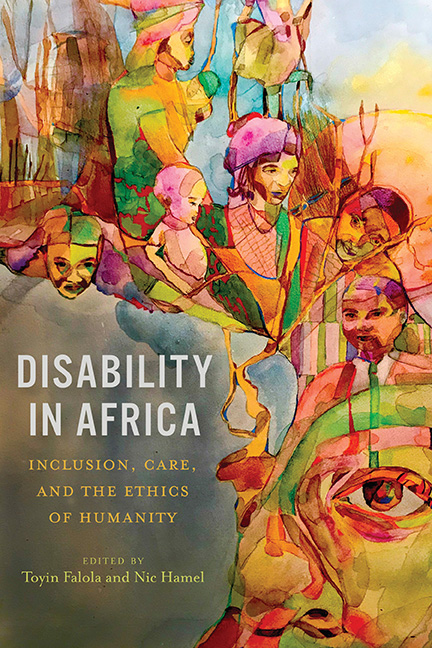Book contents
- Frontmatter
- Dedication
- Contents
- Part One Introducing the Field
- Part Two Theorizing Disability in Africa
- Part Three Representation and Cultural Expressions
- Part Four Education, Community, and Caregiving
- Part Five Activism and Barriers to Inclusion
- Conclusion: A Research Agenda for African Disability Studies
- Selected Bibliography
- Notes on Contributors
- Index
18 - Rehabilitation and the Realization of Disability Rights
Published online by Cambridge University Press: 17 June 2021
- Frontmatter
- Dedication
- Contents
- Part One Introducing the Field
- Part Two Theorizing Disability in Africa
- Part Three Representation and Cultural Expressions
- Part Four Education, Community, and Caregiving
- Part Five Activism and Barriers to Inclusion
- Conclusion: A Research Agenda for African Disability Studies
- Selected Bibliography
- Notes on Contributors
- Index
Summary
Introduction
In many countries in Africa and elsewhere, disabilities have long been associated with a curse or punishment from God, witchcraft, or illness. Consequently, the assumption is that a person with a disability needs medical attention. In this context, rehabilitation entails a range of medical responses often provided in medical facilities. Rehabilitation is associated with the notion of habilitation, which from a medical perspective seeks to provide appropriate therapies to patients. This understanding of rehabilitation and habilitation that has informed the early responses to disability were indeed characterized by the medical and welfare or charity models. The latter suggests that persons with disabilities often held in institutions need welfare assistance or charity to survive.
However, over the past decade or so, there has been a paradigm shift with the advent of the CRPD adopted in 2006 (A/RES/61/106). The convention calls for a human rights approach to disability, as well as adherence to a social model of disability. In this context, legislation and social policy should take into account the environmental barriers to the enjoyment of human rights by persons with disabilities. The CRPD in Article 26 provides for the right to habilitation and rehabilitation. It stipulates that “States Parties shall take effective and appropriate measures … to enable persons with disabilities to attain and maintain maximum independence, full physical, mental, social and vocational ability, and full inclusion and participation in all aspects of life.” The States Parties shall do this through “habilitation and rehabilitation services” that are “based on multidisciplinary assessment of individual needs and strengths,” “support participation and inclusion,” “promote … training for professionals … working in [these] services,” and “promote the availability [and] knowledge of assistive devices and technologies.”
Even so, persons with disabilities remain excluded and marginalized in our societies. According to Rosenthal and Kanter, “One of the most egregious forms of discrimination is the involuntary segregation of people in institutions.” Sometimes policies and programs intended to protect human rights may, paradoxically, violate these same rights. The aim of this chapter is to reflect on what needs to be done practically to ensure that rehabilitation policies and programs do not encroach upon disability rights but rather foster their enjoyment.
- Type
- Chapter
- Information
- Disability in AfricaInclusion, Care, and the Ethics of Humanity, pp. 389 - 404Publisher: Boydell & BrewerPrint publication year: 2021

